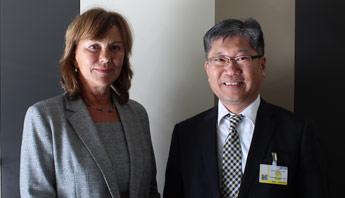Reaping the benefits of transport automation
Self-driving cars, buses and trucks have never seemed as close as to today and yet their large-scale deployment is still not ready for prime time. The attraction of automated driving lies in the promise the technology holds for safety performance, more efficient traffic, a more enjoyable “driving” experience and the development of new markets.
While the potential seems great, there are many unknowns that public authorities must manage. There are also certain pre-requisites that authorities have a responsibility to guarantee. These challenges form the basis of ITF Secretary-General Young Tae Kim's moderation of the High-level policy segment at the 81st annual session of the UN Inland Transport Committee (ITC) in Geneva, Switzerland, on 19 February.
Mr Kim underlined the two broad domains that concern where public authorities must be vigilant and act. The first relates to the technical fitness of these vehicles to be safely used on our streets. Regulatory and standard setting bodies and fora like the UNECE (UN Economic Commission for Europe) help establish these essential rules. The second relates to the broader societal impacts that will emerge through the use of these technologies – this is largely the area where the ITF has been active in its research agenda.
Following his moderatorship of the policy segment, Mr Kim met with UNECE Executive Secretary, Olga Algayerova (photo). The meeting continues a long history of collaboration between the ITF and UNECE, particularly in the area of transport statistics and the ITF's Decarbonising Transport initiative.
